-
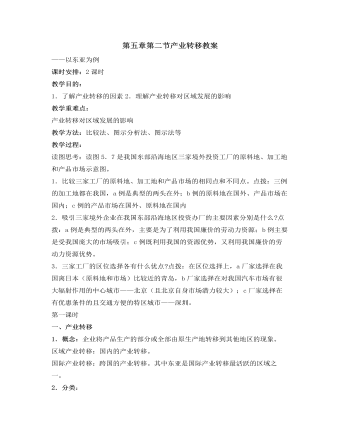
人教版高中地理必修3第五章第二节产业转移教案
1.阅读图5.16,说明产业向国外转移对日本经济的不利影响。点拨:图5.16直观的显示了产业转移对日本经济的不利影响:形成“产业转移出去的多,转移进来的少→国内生产投资不足,生产困难→市场萎缩→产业向外转移,外资不愿进入”的恶性循环。2.尽管重化工业的环境污染比较严重,但是却能为工业化的发展提供坚实的基础,因此成为发达工业的象征。日本、韩国的经济发展都经历了由轻工业(劳动密集型)到重化工业(资源密集型和资金密集型)到高科技工业(技术密集型)的阶段。(1)为什么日本、韩国在重点发展重化工业之前,要先发展劳动密集型工业?点拨:重化工业的发展一方面需要有一定的工业基础和技术工人,另一方面需要投入大量的资金,先发展劳动密集型工业有利于利用劳动力资源丰富且廉价的优势,积累资金和造就产业工人。所以,劳动力丰富的发展中国家或地区的工业化往往从优先发展劳动密集型工业开始。
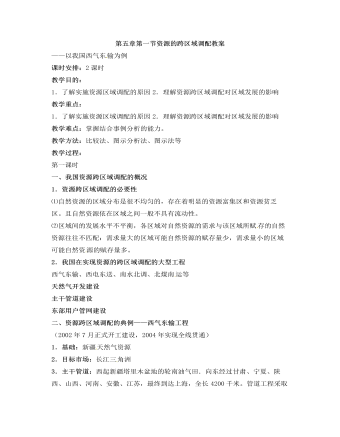
人教版高中地理必修3第五章第一节资源的跨区域调配教案
2.通过西气东输输送到上海的天然气,价格只相当于进口天然气的3/4、同等热值煤气的 2/3。你认为是否应该提高天然气的价格,以促进西部的发展。点拨:可以从不同方面分析。⑷对环境的影响①有利于改善东部地区的大气质量据监测显示,在同等热值的情况下,与煤炭相比,利用天然气作燃料几乎不产生二氧化硫、粉尘等污染物质,氮氧化物和二氧化碳的排放量也大为减少。长江三角洲地区的能源长期高度依赖煤炭,例如,上海市煤炭消费量占能源消费总量的70%。从西部地区输送来的天然气,可以部分替代煤炭。②为了最大限度减少对沿线地区生态环境的影响,西气东输工程在建设过程中,严格环境保护的要求。③在沿线农村地区推广使用天然气,可减少农民对薪柴的需求,从而缓解因植被破坏而带来的环境压力。
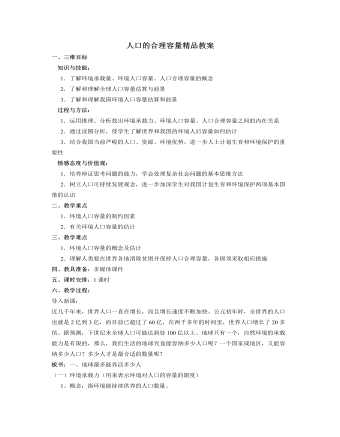
人教版高中地理必修2人口的合理容量精品教案
师:在保证现代人生活幸福,同时又不降低未来人生存质量的前提下,一个地区、一个国家,乃至整个地球到底适合养活多少人呢?为了回答这个问题,科学家在环境人口容量的基础上,又提出了人口合理容量的概念。板书:(一)人口的合理容量1、概念:是指按照合理的生活方式,保障健康的生活水平,同时又不妨碍未来人口生活质量的前提下,一个国家或地区最适宜的人口数量。2、特点:理想的、难以确定精确数值的“虚数”3、概念提出的意义:对于制定一个地区或一个国家的人口战略和人口政策有着重要的意义,进而影响区域的经济社会发展战略。(二)正确处理人类在世界各地消除贫困与保持人口的合理容量的关系本部分采取教师提出问题——学生讨论——阅读教材——学生进一步探讨——学生代表发言——学生补充——教师总结的程序进行:(1)请同学们结合日常生活实例和教材分析说明人类要在世界各地消除贫困并保持人口的合理容量任务的艰巨性?
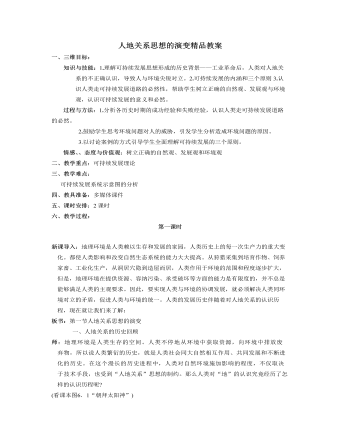
人教版高中地理必修2人地关系思想的演变精品教案
生1:公平性原则——同代人之间要公平,代际之间、人类与其他生物种群之间、不同国家与地区之间也要公平。生2:持续性原则——地球的承载力是有限的,人类的经济活动和社会发展必须保持在资源和环境的承载力之内。生3:共同性原则——发展经济和保护环境是全世界各国共同的任务,需要各国的共同参与。同时,地球作为一个整体,地区性问题往往会变为全球性问题,所以地区的决策和行动,应有助于实现全球整体的协调。活动与探究:2·阅读下面一篇新闻报道,你认为“给蛇让道”有没有必要?答:有必要·人类在森林区内修筑公路,已经侵占和破坏了蛇的生存环境,如果再不对蛇的迁移进行保护,蛇数量的减少以至灭绝将不可避免。这种做法体现了可持续发展的公平性原则和共同性原则。3·用可持续发展的观念作为衡量标准,对下列观点作出评价。(1)人类有义务保护地球上所有的物种,人类的发展不应该危及其他物种的生存。答:正确。符合可持续发展的公平性原则。
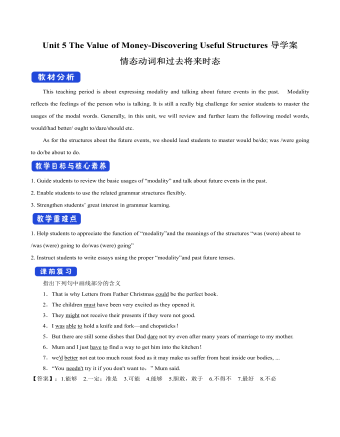
新人教版高中英语必修3Unit 5 The Value of Money-Discovering Useful Structures导学案
4.They were going to find someone to take part in their bet when they saw Henry walking on the street outside.[归纳]1.过去将来时的基本构成和用法过去将来时由“would+动词原形”构成,主要表示从过去某一时间来看将要发生的动作(尤其用于宾语从句中),还可以表示过去的动作习惯或倾向。Jeff knew he would be tired the next day.He promised that he would not open the letter until 2 o'clock.She said that she wouldn't do that again.2.表示过去将来时的其他表达法(1)was/were going to+动词原形:该结构有两个主要用法,一是表示过去的打算,二是表示在过去看来有迹象表明将要发生某事。I thought it was going to rain.(2)was/were to+动词原形:主要表示过去按计划或安排要做的事情。She said she was to get married next month.(3)was/were about to+动词原形:表示在过去看来即将要发生的动作,由于本身已含有“即将”的意味,所以不再与表示具体的将来时间状语连用。I was about to go to bed when the phone rang.(4)was/were+现在分词:表示在过去看来即将发生的动作,通常可用于该结构中的动词是come,go,leave,arrive,begin,start,stop,close,open,die,join,borrow,buy等瞬间动词。Jack said he was leaving tomorrow.
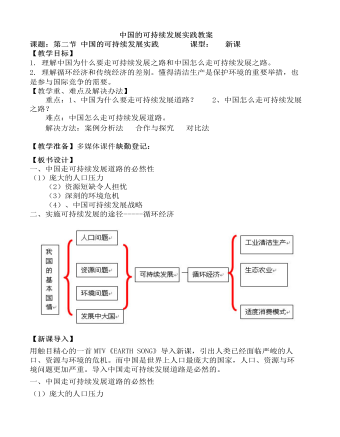
人教版高中地理必修2中国的可持续发展实践教案
1、在工业经济结构调整中,实现循环经济的基本途径是清洁生产让学生分组课前收集乡土地理中清洁生产的案例,将小组收集的案例写成小组作业。让两个小组到课堂上展示,并画出流程图。2、在农业经济结构调整中,我国大力推行生态农业,以实现循环经济留民营村的生态农业按可持续发展的观点,把保护生态环境和发展农村经济有机结合起来 主要措施:(1)调整产业结构:五业并举,全面发展 各业之间相互补充、相互促进、既保持了平衡,又促进了经济的发展 (2)开展综合利用 促进了粮食、牲畜生产的发展,增加了经济效益,降低了污染,净化了环境,有利农民健康,还改变了农田施肥结构,有效地保护了土地资源 (3)广开源流,开发利用新能源 利用太阳能和生物能,节省了以往购煤的开支,还净化了环境 意义和发展方向
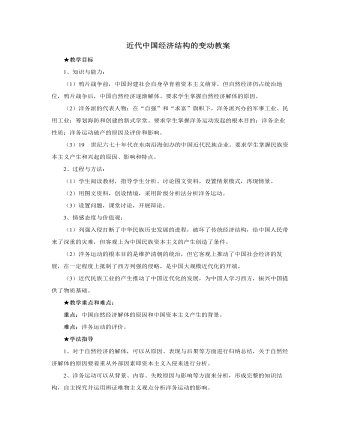
人教版高中历史必修2近代中国经济结构的变动教案
★本课小结:通过学习,我们可以看出鸦片战争后,随着外国资本主义经济的入侵,中国近代经济结构发生了重大变动:自然经济逐渐瓦解,商品经济日益发展,中国民族资本主义产生,中国社会经济结构正经历着一场史无前例的大转型。清政府内部的洋务派为了维护封建统治,掀起了洋务运动。这次运动在促使本国封建经济瓦解的同时,对民族资本主义的产生起了诱导作用。受外商企业和洋务运动的诱导,十九世纪六七十年代民族资本主义在中国产生,由于受外国资本与本国封建势力的压制,举步维艰;下节课,我们将关注中国资本主义的曲折发展。★问题解答⊙【学思之窗】你认为郑观应的批评是否有道理?为什么?参考答案:(1)有道理。(2)原因:①郑观应认识到了社会制度层面的“体”与科学技术层面的“用”之间不是等同的关系。
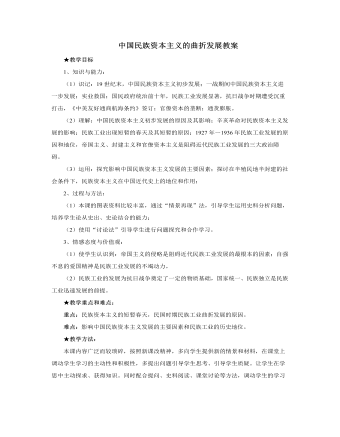
人教版高中历史必修2中国民族资本主义的曲折发展教案
①自然经济的逐步解体;(西方列强的侵略)在给中华民族带来沉重灾难的同时,也不断地冲击着中国社会的生产方式和思想观念,分解着中国自给自足的封建经济。客观为民族工业的兴起和发展提供了某些条件和可能。②清末至民国政府鼓励兴办实业;(历届政府的扶植)由于时代潮流的冲击和巩固统治的需要,清末至民国历届政府都鼓励兴办实业。③反帝爱国运动的推动。(反帝爱国运动的推动)中国人民反帝爱国热情不断高涨,使“实业救国”具有日益广泛的社会基础,特别是抵制洋货、提倡国货运动不断兴起,有力推动民族工业的发展④实业家自强不息的爱国精神。(实业家们自强不息的爱国精神)是支撑民族工业曲折发展的动力和力量的源泉。本课小结:扼要回顾民族工业的曲折发展历程,进而启导学生探究影响其发展的因素,最后分析其历史地位。中国民族资本主义的发展在中国近代史上具有重要的历史地位,对近代中国历史和社会的发展产生了重大影响。
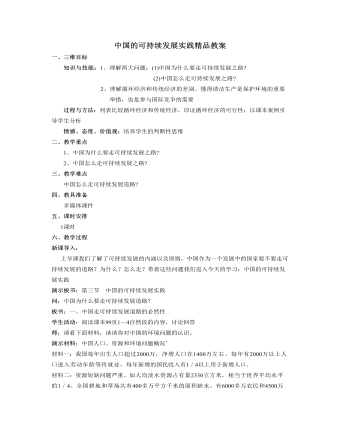
人教版高中地理必修2中国的可持续发展实践精品教案
师:对。具体说一说沼气池在这个系统中为什么居于核心纽带地位。生:因为沼气池充分利用了生产过程的废料,实现了清洁生产,减少了浪费和污染,而且很好地实现了生态循环。师:不错!留民营生态农业的实质就是:地尽其利,物尽其用,最大限度地循环利用资源和消除环境污染,达到节约、高效的目的,真正实现了生态效益、经济效益、社会效益三方面的高度统一,实现了可持续发展。师:实施可持续发展战略必须依靠公众的支持和参与,我们每一个人都应该从自身做起,那我们可以在日常生活中可以采取哪些有益于可持续发展的行动? 生1:节约粮食、爱惜粮食。生2:不乱扔垃圾,垃圾分类回收。生3:不开“无人灯”。生4:节约用电、用水。生5:减少空调的使用,在冬夏季分别降低、提高空调温度的设置。
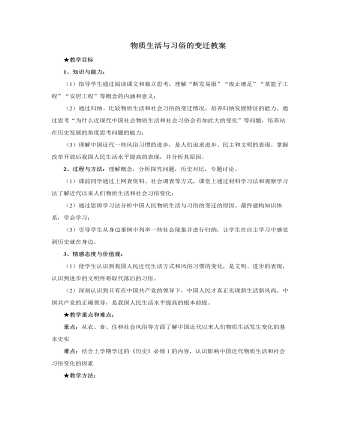
人教版高中历史必修2物质生活与习俗的变迁教案
★教学总结:(1)我国衣着服饰变化的三大阶段第一阶段(鸦片战争后到新中国的建立):这一阶段的阶段特征为中式与西式、传统和现代服饰并存男装:长袍马褂、西装、中山装 女装:旗袍(新式与旧式)第二阶段(新中国建立后到十一届三中全会):这一时期由于政治上的影响,阶段特征为衣着朴素,与革命相关的服饰成为主流男装:列宁装、中山装、绿军装女装:列宁装、布拉基、绿军装第三阶段(十一届三中全会后):阶段特征为与世界接轨,异彩纷呈;具体表现在,服饰由最基本的防寒保暖向美观大方转变,各种款式的服装层出不穷现在的服装是色彩鲜艳、款式多样,什么牛仔服、休闲服、西装、T恤衫、晚礼服,真是不胜枚举。每年服装的流行色、流行款式不断改变,大街上的姑娘和小伙子永远领导着时装新潮流。模特表演、模特广告和模特大赛已成为人们穿着方面不可缺少的内容。
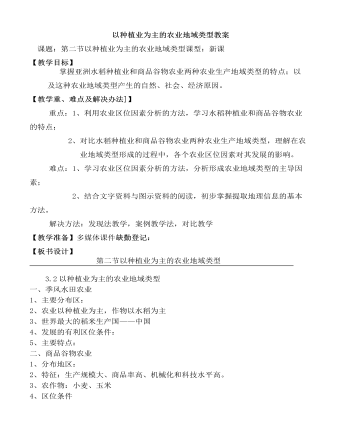
人教版高中地理必修2以种植业为主的农业地域类型教案
1.指导学生阅读“亚洲水稻农业分布示意图”2.指导学生阅读“亚洲气候类型分布图”和“亚洲地形分布图”3.指导学生阅读“亚洲人口分布图”4.提示学生思考:世界主要粮食作物有哪些?水稻种植对气候和土地的要求是什么?东南亚的气候和地形还适宜其他农作物生长吗,为什么不选择?水稻种植对劳动力数量有什么要求?5.引导学生总结本区农业生产的特点。6.引导学生总结季风水田农业的区位因素。7.提醒学生思考:“农业区位的主导因素是自然因素还是社会因素?通过对比商品谷物农业来总结。”(过渡)。列举农业区位因素。画图或示意讲解。阅读示意图,指图说出分布区域。说出水稻分布区的气候类型和气候特点,以及地形特征。说出水稻分布区的人口分布特征。思考并回答问题。列举本区农业生产的特点。列举本区农业生产的区位因素。
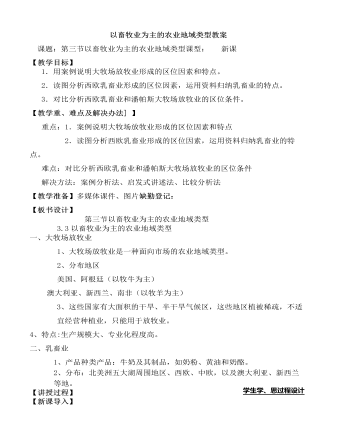
人教版高中地理必修2以畜牧业为主的农业地域类型教案
提问:阿根廷牧牛业以肉牛为主,那除肉牛以外还有哪种类型的牛呢?(奶牛)引入乳畜业。下面我们就来学习乳畜业。板书:二、乳畜业讲述:乳畜业随着城市发展而形成的面向城市市场的商品化、集约化畜牧业地域类型,其生产对像主要是奶牛。活动:请大家阅读52-53面内容,思考下列问题:提问:1、乳畜业产品有哪些?(牛奶及其制品)2、乳畜业主要分布在哪些地区呢?3、乳畜业是靠近消费市场好还是远离市场好?为什么?板书:1、产品种类产品:牛奶及其制品,如奶粉、黄油和奶酪。2、分布:北美洲五大湖周围地区、西欧、中欧,以及澳大利亚、新西兰等地。3、多紧邻消费市场(由于牛奶及大部分乳制品不耐贮藏,且运输不便)目前,世界上许多大城市都有奶牛农场分布于市郊。我国北京、上海等大城市周围也发展了乳畜业。活动:第53面及第54面的活动题。
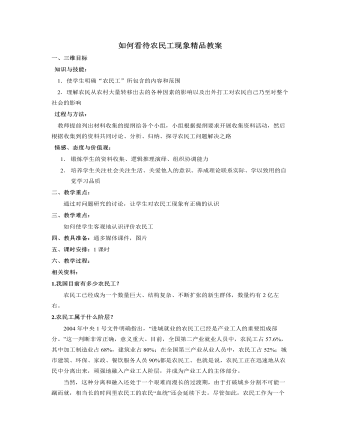
人教版高中地理必修2如何看待农民工现象精品教案
尽管如此,农民工作为一个新的社会阶层,其独特的经济需求和政治诉求应该得到充分的尊重。虽然农民工的“根”还在农村,但是他们已经脱胎换骨,日益成长为一个迫切需要社会认可的新兴阶层。3.农民工处于何种生存境况?作为“廉价劳动力”,工资水平低,拖欠时有发生。作为“超时劳动力”,工作时间极长,超负荷从事繁重工作。作为“高危劳动力”,社会保障缺失,各种安全事故频繁。4.农民工问题有多么重要?农民工问题关系到农业增效、农民增收和农村繁荣。农民工问题关系到工业化、城镇化和“以工补农、以城促乡”。农民工问题关系到社会主义和谐社会建设。5.解决农民工问题应该做些什么?构建城乡一体化就业体系。健全农民工权益保障制度。强化农民工输出地和输入地培训。稳妥解决农民工户籍问题。改进对农民工的管理和服务。
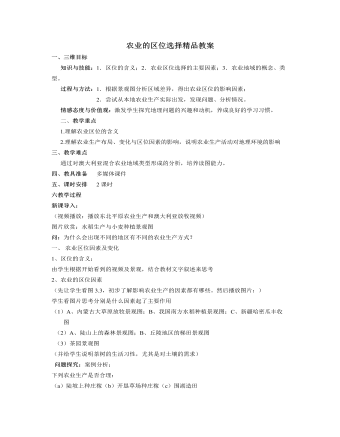
人教版高中地理必修2农业的区位选择精品教案
案例探究:环地中海地区农业的变迁让学生思考:此地哪些因素发生了变化,农业生产方式进行了如何调整?效果如何?二、农业地域的形成1、农业地域的概念:由于以上各因素的共同影响,在一定的地域和一定的历史条件下,形成了相应的生产地区,称为农业地域。农业地域的类型主要有:种植业、畜牧业、混合农业。(在这里分别给学生展示一些农业生产类型的图片,并简单说明什么是种植业、什么是畜牧业、及什么是混合农业)案例探究:阅读澳大利亚地混合农业生产思考:(1)、澳大利亚农业生产的特点是什么?(2)、澳大利亚混合农业的分布在哪里?受哪些区位因素的影响?(3)澳大利亚混合农业生产有哪些优点?
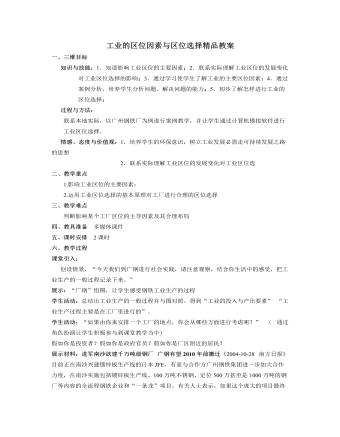
人教版高中地理必修2工业的区位因素与区位选择精品教案
思考:结合资料,看看“广钢”的搬迁还考虑到什么因素?主要从谁的角度去考虑?展示资料:广钢建于1958年,由于城市化进程的加快,原来地处偏僻的广钢一带现已成闹市,广钢因此给周边带来了许多不便,并屡被投诉,投诉的主要内容是烟气、粉尘超标。近日,《珠三角环境保护规划纲要(草案)》(以下简称《纲要》)正式提交省人大常委会审议,按照《纲要》要求,2010年前,广东省将关、停、并、转、迁位于城市中心区高能耗、重污染的工业企业。学生讨论:环保要素、政策要素……从市民、政府等社会角度去考虑板书:2、环保要素 3、政策的变化小结:影响工业区位选择的因素很多,不同的工业区位选择要考虑的主导因素可能是一个或几个,应因地制宜,具体分析。并且影响区位选择的因素随着社会的发展而变化;社会、环境需要对工业区位也有一定的影响力。所以工业区位选择是复杂的,应综合考虑各种因素,以取得最大的经济、社会、环境综合效益。学生活动:计算机模拟工业选址,看谁是最英明的决策者(通过实践应用让学生感受到工业的区位选择应综合考虑)
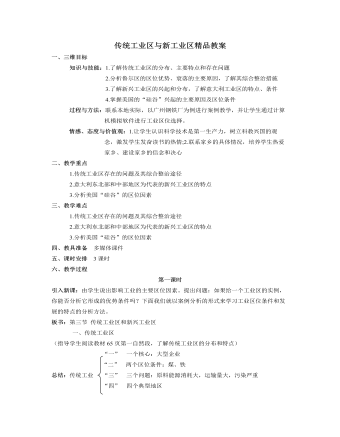
人教版高中地理必修2传统工业区与新工业区精品教案
③在萨斯索罗地区集聚的相关企业和服务性机构有哪些?④萨斯索罗瓷砖工业小区的生产—销售—服务网络中支撑企业、辅助性企业、服务性企业、服务性机构有哪些?学生回答问题后教师小结:意大利的新工业区,以中小企业集聚的工业小区为独特的发展模式。工业小区的优势是有助于加强专业化,提高生产效率,降低生产成本,增强在市场上的竞争力。完成课本70页活动:1. 比较温州乡镇企业与意大利新工业区的发展有什么异同(相同:有大批廉价劳动力,企业规模小,以轻工业为主,企业生产高度专业化,资本集中程度低。不同:最大的不同是意大利工业小区密切联系协作,共同形成巨型企业,温州虽生产同种产品,但是联系协作不如意,形成多家企业竞争局面,规模效应大减。)2. 温州乡镇企业的发展有哪些些问题?你能为其解决这些问题提出合理化的建议吗?(加大技术投入,企业间联系协作,杜绝恶性竞争等)
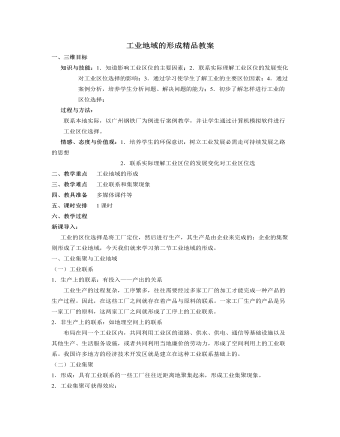
人教版高中地理必修2工业地域的形成精品教案
2.音响生产的工业集聚有哪些优势?点拨:可以加强各企业间的信息交流和技术协作,降低中间产品的运输费用和能源消耗,进而降低生产成本,提高生产效率和利润,取得规模效益。3.根据惠州音响零件的来源百分比,说明惠州音响零件供应厂家的地域分布有什么规律。点拨:距离递减规律,距离惠州音响整机组装厂越近的地区零件来源所占比例越高。三)工业地域工业联系—--------- 工业集聚------------工业地域工业地域:工业集聚而形成的地域称之为工业地域。1.工业地域形成的两种情况⑴自发形成的工业地域: 以生产工序上的工业联系为基础,以降低生产成本为目的。⑵规划建设的工业地域:如我国许多地方的经济技术开发区:①把生产上有投入 产出联系密切的工厂布局在一起。②先建成基础设施,再吸引投资者建厂,形成空间和信息共同利用的工业联系。我国许多地方的经济技术开发区,就是利用这一原理建成的。2.两类不同性质的工业地域
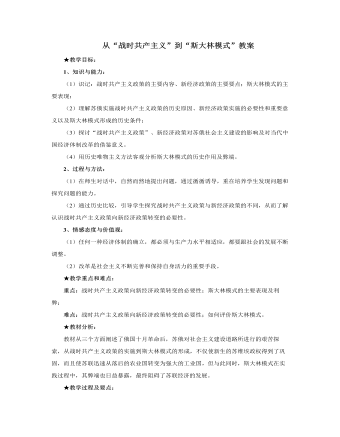
人教版高中历史必修2从“战时共产主义”到“斯大林模式”教案
5、弊端:(1)经济发展不均衡,片面发展重工业,使轻工业和农业长期处于落后状态;(2)对农民的剥夺太重,挫伤了农民的生产积极性;(3)长期执行指令性计划严重削弱了企业的生产自主权,不利于发挥企业的生产积极性,制约了苏联经济的可持续发展。(4)计划经济体制确立后,没有随着社会的变化进行调整,二战后逐渐僵化,丧失了自我完善的功能,成为苏联解体的重要因素。【合作探究】斯大林模式的评价及经验教训:积极:①使苏联迅速实现了 工业化②苏联经济实力的迅速增长,为反法西斯战争的胜利奠定了 物质基础 。消极:①政治:高度集权,破坏了 民主与法制 ; ②经济:优先发展重工业使 农业和轻工业长期处于落后状态,农民生产积极性不高;计划指令,压制了地方和企业的积极性,阻碍苏联经济的发展高度集中的计划经济体制,成为东欧剧变和苏联解体的重要原因。
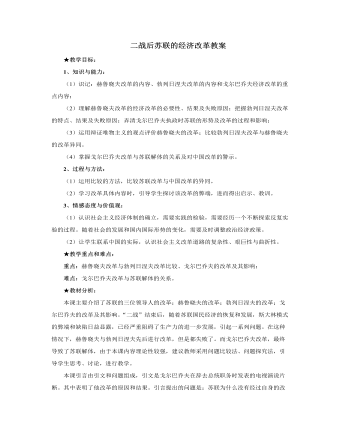
人教版高中历史必修2二战后苏联的经济改革教案
⑤强调对外关系的灵活性。戈尔巴乔夫指出在对外政策中要采取多种办法选择不同的策略路线达到既定目标。在外交谈判中不要为自己制造死胡同,也不要给对方制造死胡同,要善于迎合伙伴,寻求接触点。在这种思想指导下,苏共采取的对外战略是以军控为中心的缓和战略,具体政策是继续与美国就裁军、消减核武器、限制地区冲突等问题进行谈判,缓解苏美关系;对西欧争取建立“全欧大厦”;对东欧实行纠偏、不干涉政策;对中国改善关系,实现关系正常化;调整与第三世界国家关系,解决阿富汗、柬埔寨等问题。 3、影响:①经济改革措施仓促上马,缺少宏观决策和相应的配套措施;加上戈尔巴乔夫没有放弃苏联的传统做法,继续优先发展重工业,致使改革未达到预期的效果,苏联经济持续下滑②经济体制改革受挫后,把改革的重点转向政治领域,最终导致国内局势的失控和苏联的解体。
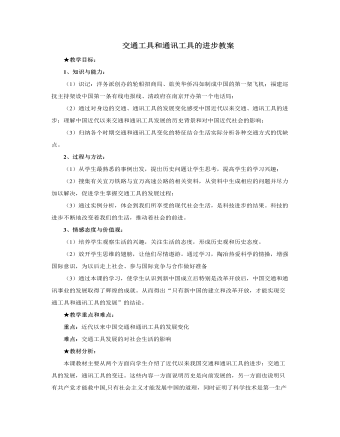
人教版高中历史必修2交通工具和通讯工具的进步教案
★教后记:历史教学的最高目标不是单纯的记忆和培养能力,而是树立正确的历史观,培养学生的历史责任感。从这一点讲,新课标及新课标教材给老师极大的发挥空间,摆脱了以往的“教教材”,真正实现了 “用教材教”,只有这样,教师才不只是一个“备课”的“教书匠”,而是一名设计教学“设计师”,以教材为砖瓦,建造有自己独特风格的教育大厦。这是我设计教学的出发点。开放式的课堂需要思想开放的教师,但对教师的课堂驾驭能力要求更高,否则“一放就活,一活就乱”,只求课堂热闹,热闹过后,学生一无所获,那么这样的开放课堂依然是失败的。开放式的课堂并不是任由学生说,教师必要的引导与客观的评价尤为重要。★问题解答⊙【学思之窗】请谈谈,火车机车的不断改进,给国民经济发展、百姓生活带来怎样的影响?答案提示:运输量大,有利于各地区的物资交流和劳动力流动,促进经济发展;交通便利快捷;机车内部环境舒适,给百姓出行带来方便。





















